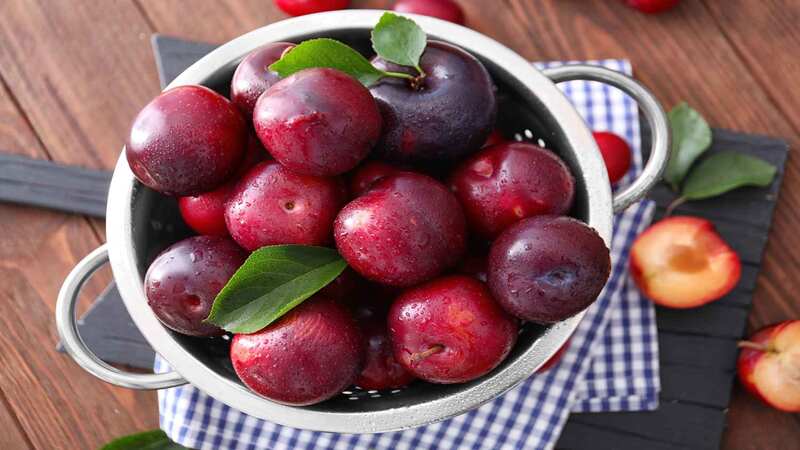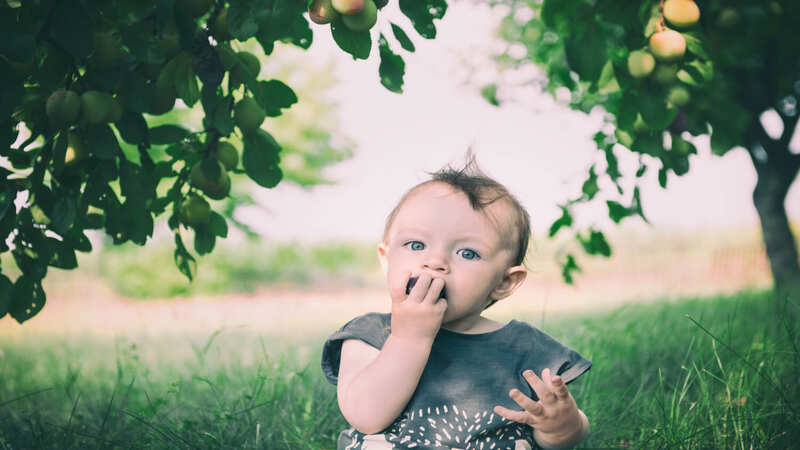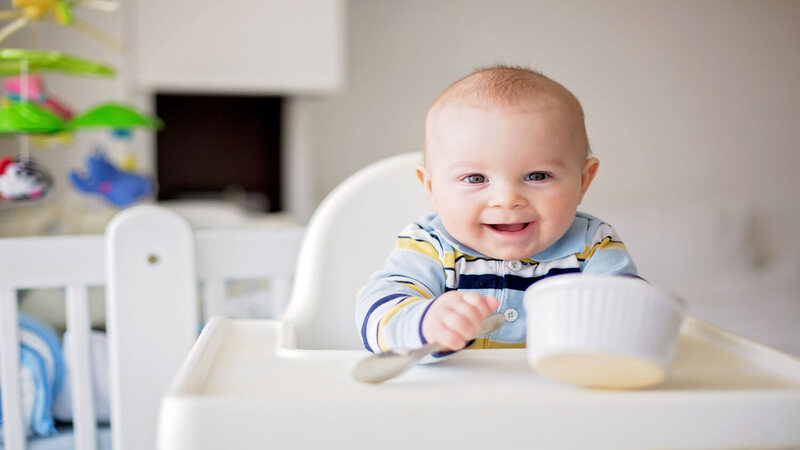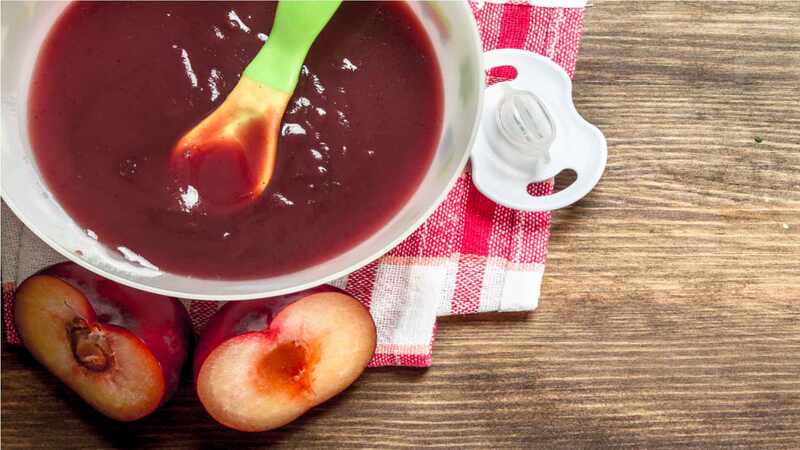
Parents always stay extra careful when it comes to babies, regardless of the context. For instance, they check if their little one is sleeping peacefully or twisting or turning on the bed. Similarly, when we talk about introducing new food items, it is natural to feel apprehensive. Once babies are ready for solids, when to give what foods and what to avoid is a constant question for most parents. In this article, we discuss all about plum for babies.
Plum is an excellent source of nutrition. But the high fiber content can cause laxative effect when you overfeed your baby. As with every food you introduce to your little munchkin, you must remember that moderation is the key. As long you take that care, you can safely give plums to your little one.
Is Plum Safe For Babies?
Plums are one of the best fruits you can easily give to your little one. But you should follow a proper routine for introducing this new food item to your baby’s diet. Also, if your child is suffering from any health conditions, especially a digestive problem, it will be best to take advice from your pediatrician and then proceed further.
When Can You Introduce Plum to Your Baby?
Ideally, you can introduce plums to your baby once they are ready for solids at 7 months of age. But for parents who want to be extra careful or who are apprehensive about giving this fruit in the early stages, you can safely introduce plums to your baby’s diet is around ten months of age. This is because they have already started eating solid or mashed food items like mashed rice, boiled apples, pureed green veggies, etc., and are capable of safely assimilating this fruit. Therefore, you won’t have any problem introducing this new fruit to your baby’s diet.
Nutritional Values of Plum
Plum is one of the most popular stone fruits, known for its high nutritional content that you may not find in anything else. It has a generous quantity of proteins and carbohydrates — the two most essential macronutrients needed for the proper development of babies and the prevention of Kwashiorkor and Marasmus. Similarly, it is packed with tons of minerals and vitamins that can make your baby’s immune system much stronger.
We have listed the entire nutritional content and its values in the below section for a brief overview.
| Nutrients | Quantity |
| Carbohydrate | 14.7 g |
| Fibers | 8 g |
| Proteins | 1.5 g |
| Iron | 0.11 g |
| Potassium | 103.62 mg |
| Magnesium | 4.62 mg |
| Manganese | 0.035 mg |
| Phosphorus | 10.56 mg |
| Copper | 0.038 mg |
| Zinc | 0.07 mg |
| Niacin | 0.275 mg |
| Pantothenic Acid | 0.089 mg |
| Riboflavin | 0.017 mg |
| Thiamine | 0.018 mg |
| Vitamin A | 227.70 IU |
| Vitamin C | 6.3 mg |
| Vitamin B6 | 0.019 mg |
| Vitamin E | 0.17 mg |
| Vitamin K | 4.2 mcg |
All the nutritional facts presented in the above section are concerned with 100 grams of plum fruit. So, if you are following a calorific chart for your kid, consider this rate to ensure you are feeding the right amount of food to the little one. Apart from this, the actual nutritional content may vary from one plum type to the other, so discussing the addition of this fruit with a doctor is advisable. This way, you can easily feed your baby with complete safety.
Amazing Top 5 Health Benefits of Plum For Babies

Plums have a lot of benefits for babies, so knowing about them beforehand will be helpful for you because you can decide whether your baby should try this new fruit or not. This given section presents the five most important advantages of this particular stone fruit for babies.
1. Boosts the Immune System
One of the major benefits of plums is their high vitamin and mineral content. Due to several antioxidants, and other essential components, the fruit increases immune strength in babies. It further ensures your baby is safe from common diseases like cough and cold, fever, and any other type of infection. Besides, if your little one has already suffered from any health issue, the fruit will help in faster recovery.
[Read : How to Increase Immunity in Babies?]
2. Strengthens Bones and Cartilage
Plums contain a generous amount of calcium and phosphorus. These two nutrients are essential for the proper growth of bones and cartilage, especially in babies under one year of age. You won’t have to worry about your child suffering from any calcium or phosphorus deficiency diseases like rickets, feeble bones, improper balance, etc once you start your little one on this fruit.
3. Prevents Oxidative Damage
Thanks to the huge number of antioxidants, plums are great for reducing oxidative damage to different types of cells in babies. Oxidative damage can cause severe health issues like skin problems, retarded mental growth, sagging skin, impaired vision, etc. So, when you include plums in your baby’s food diet, the antioxidants will prevent the oxidative compounds from damaging cells and tissues, thereby ensuring optimal health for your kids.
4. Eases Indigestion and Constipation
Another outstanding benefit of adding plums to your baby’s diet is the high amounts of fiber in the fruit. Fiber plays a crucial role in regulating digestion and preventing constipation. Therefore, your baby can easily digest the different types of foods you are feeding them and get relief from mild to severe constipation.
5. Tons of Essential Vitamins
Last but not the least, plums come with tons of vitamins that ensure optimal growth and development of your baby. For example, Vitamin A present in plum will prevent night blindness or any other problem in your baby’s eyes. Similarly, vitamin C helps reduce the chances of scurvy and other such problems.
Precautions to Take While Giving Plums to Babies

Although plums are safe for babies and you can easily include this in their diet, there are certain things you should know before you proceed with this fruit. For example
- You should always remove the stone or the pit from the fruit before serving it to your kid.
- Always use fresh plums and not frozen ones when feeding your infant.
- Do not overfeed plums as they can result in diarrhea due to the high fiber content.
- Start with a tea spoon of the puree, follow the three day rule, watch out for any allergic reactions, and then you can continue giving this fruit to your baby.
- Sometimes, parents tend to feed canned plums to their babies. However, it is better to avoid this habit because food packed in cans can contain preservatives and toxins that can be unsafe for little ones.
[Read : The 3-Day Wait Rule For Babies To Introduce Solids]
Are There Any Side Effects of Plum For Babies?
The side effects of plums in babies are not yet known. But that doesn’t mean you shouldn’t be aware of how your baby is behaving or feeling after you feed the fruit for the first time. If you think there is something to be concerned about, visit a doctor before feeding plums or after feeding them.
Plums have laxative effects. Hence you must bear in mind not to overfeed the fruit to your baby.
Top 4 Tasty And Healthy Plum Recipes For Babies

There are several delicious recipes that you can use for feeding plums to your kids. Most times, parents have to deal with tantrums from their little ones for eating food items like fresh fruits, salads, green vegetables, etc. You should try some of the most interesting recipes equally delicious and beneficial for babies.
1. Plum Puree
This is the best first way to introduce this fruit to your baby. Remove the seed from plum, chop the fruit into quarters. Your can retain the skin or remove it. Add the chopped fruit to boiling water and allow everything to boil for about 10 minutes till the fruit pieces are cooked well and softened. Drain the water. You can now add the fruit to a blender to make a puree. Add boiled and cooled water to thin out the consistency.
2. Plum Mash
Once your baby is comfortable with puree, you can introduce this fruit in a mash form. Simply follow the above recipe to boil the fruit. After draining out the water, you can mash cooked fruit pieces with the back of your spoon and feed this mash to your baby.
3. Plum Banana Puree
After you have boiled plum pieces, add a few pieces of chopped banana and blend or mash everything together and give it to your baby.
4. Plum Cinnamon Puree
Add some cinnamon to boiling water. Now add chopped plum pieces. Cook everything well till the plum pieces turn soft. Drain the water and add the plum pieces to a blender. Add water if needed. Blend everything well before feeding.
Now that you are aware of the benefits of plums for babies it’s time to make a proper plan about how you can incorporate this fruit into their diet chart. If you have any confusion or feel apprehensive, it’s better to discuss this once with your doctor to have peace of mind.
FAQ’s
1. Is Plum Good For Babies?
Plum is an excellent fruit for babies. It is full of nutrition and high in fiber content which helps in proper growth and development and helps prevent issues such as constipation.
2. How do I Introduce Plums to My Baby?
You can start with plum puree which is made my pureeing well-cooked deseeded plum pieces.
3. Can You Give Your Baby Raw Plums?
No, it is always good to give cooked plums in the initial months when you introduce this fruit to your baby. You can give raw plums once your baby is a year old after talking to the pediatrician.
Read Also: Butternut Squash For Babies – When to Introduce, Benefits and Precautions
